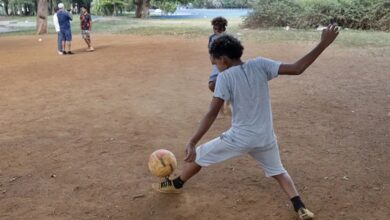Latin America’s Battle Against Online Abuse in Women’s Soccer
Amidst the recent Women's World Cup, one in five female players received discriminatory messages, highlighting an urgent issue in the Latin American soccer community and beyond.

Photo: Olympics
The Latin American Post Staff
Escucha este artículo
Leer en español: La batalla de América Latina contra el abuso en línea en el fútbol femenino
Unveiling the Dark Reality
The Women's World Cup held in Australia and New Zealand in 2023 has brought to light a disturbing reality in the soccer world, particularly resonating with the Latin American soccer community. A FIFA and FIFPRO report revealed that one in five players participating in the tournament received discriminatory, offensive, or threatening messages on social media. This statistic is not just a number; it reflects a deeper societal issue that extends beyond the soccer field and into Latin America's broader cultural and historical context.
The tournament, which Spain won against England, saw nearly 700 players and coaches actively using over 2,000 social media accounts under the Social Media Protection Service (SMPS) protective umbrella. The service analyzed over 5.1 million posts and comments in 35 languages, revealing a shocking prevalence of online abuse targeted at female soccer players.
This abuse, predominantly homophobic, sexual, and sexist, was almost 50% more likely to target female players than their male counterparts who played in the Qatar 2022 World Cup. This alarming disparity underscores a deep-rooted gender bias and discrimination problem, not just in soccer but in Latin American society as a whole.
Historical Struggles: Latin America's Complex Social Fabric
With its rich soccer history and culture, Latin America has long battled discrimination and inequality issues. The region's complex social fabric, woven with threads of colonialism, machismo, and socioeconomic disparities, has often sidelined women's sports, particularly soccer. The rise of female soccer players on the international stage challenges these traditional norms. Still, the journey is fraught with obstacles, including online abuse.
The proactive measures taken by FIFA and FIFPRO through the SMPS, employing artificial intelligence to shield participants from internet abuse, are commendable. These steps, while essential, also highlight the need for broader societal change. FIFA President Gianni Infantino's assertion that "discrimination has no place in soccer or society" echoes the sentiment that the fight against online abuse is not just a battle for soccer's governing bodies but a collective societal responsibility.
Mental Health Risks
David Aganzo, President of FIFPRO and the Spanish Soccer Players Association, rightly points out the mental health and well-being risks posed by this toxic online environment. The responsibility to protect soccer players within their professional sphere extends to creating a safer, more respectful online space.
The ongoing collaboration between FIFA and FIFPRO is crucial, especially in the Women's World Cup context. However, as Aganzo emphasizes, this is not a fight that can be won in isolation. It requires a concerted effort from all stakeholders in the soccer community and beyond.
Soccer as a Microcosm of Societal Struggles
Historically, Latin American soccer has been a microcosm reflecting broader societal issues. The online abuse faced by female soccer players is not just a problem of the digital age; it is a continuation of longstanding struggles against sexism, discrimination, and inequality. The region's soccer community, with its passionate fan base and cultural significance, has the potential to be a powerful catalyst for change.
Also read: Fan Violence Continues to Overshadow Colombian Soccer's Climactic Matches
The collaboration with the United Nations Office for Human Rights in the "No Discrimination" campaign is a step in the right direction. It invites sports entities worldwide to join the fight against online abuse. This global initiative resonates deeply with Latin America, where soccer is not just a game but a reflection of society.
In conclusion, the issue of online abuse against female soccer players during the Women's World Cup is a stark reminder of the challenges still faced in achieving equality and respect in sports and society. For Latin America, a region where soccer is intertwined with cultural identity, this issue presents an opportunity to lead by example. Addressing this abuse head-on, the Latin American soccer community can significantly shape a more inclusive, respectful, and equitable society for future generations.




